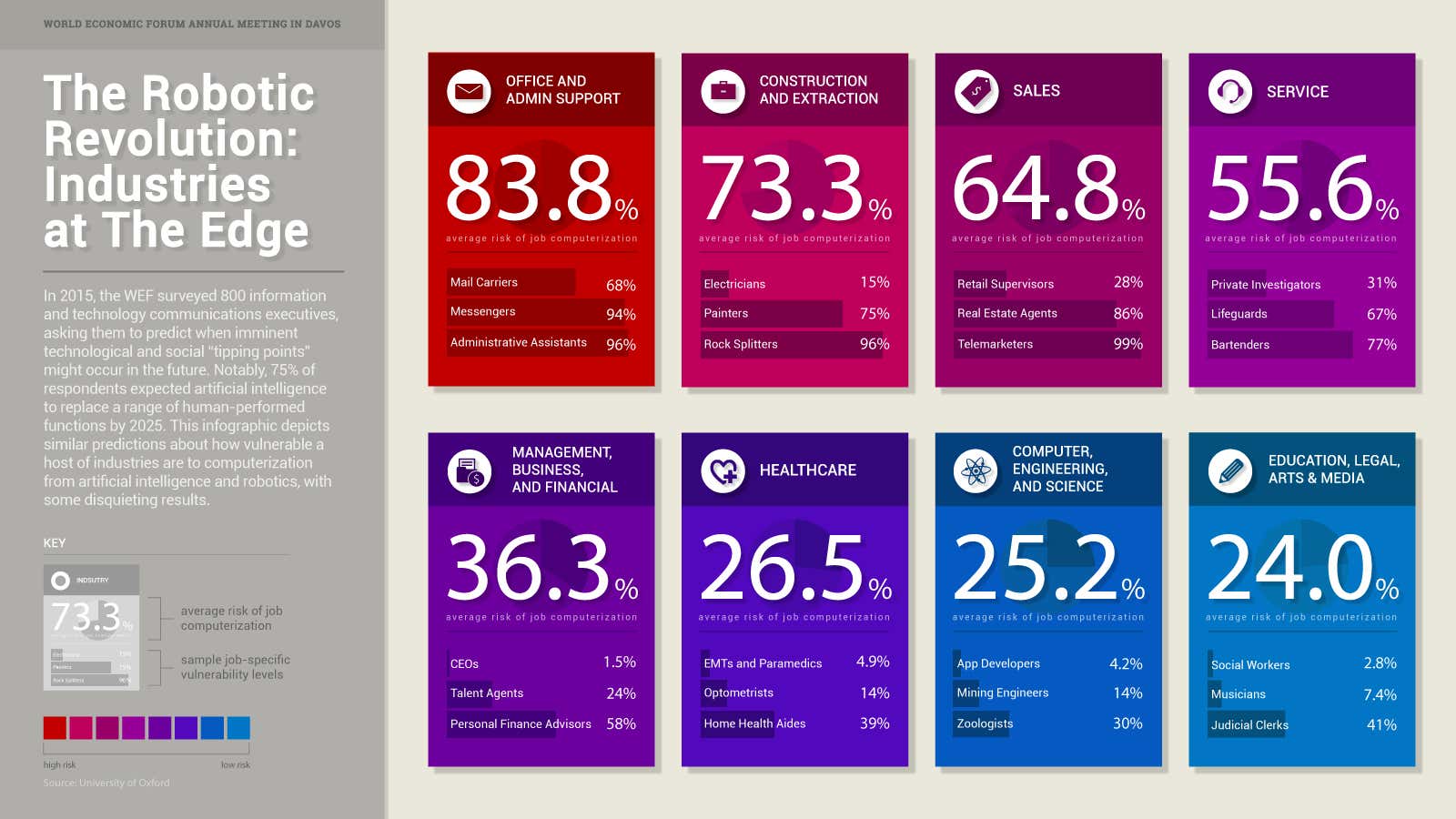(See the infographic enlarged.)
Its setting may be remote, but the annual Davos summit always seeks to reach out and grip the forces and events propelling the planet. The backdrop of market turmoil on day two made this quite clear, as world leaders across disciplines mixed spot analysis and long-term perspective. Here are the themes and developments that rose over the Alps.
HARD LANDING FOR CHINA? Answers to one of the most urgent questions facing global leaders at the start of day two were discussed at the morning’s “Where is the Chinese Economy Heading?” panel. IMF chair Christine Lagarde noted the transition in China from an industrial, infrastructure, and export-driven economy to one of consumer and discretionary spending, with anti-corruption and reform initiatives to boot. She asked Chinese leaders to address a “communication issue” sowing uncertainty over their plans and market movements, though she expressed confidence in China’s currency reserves and the IMF’s 6.5% predicted growth rate for the year. Bridgewater founder Ray Dalio urged calm: “A bad year in China is going to be a great year in any other country.”
Because every economy feels the impact of business unrest in China, several panels focused on the outlook there. In a special “Global Financial Priorities” conversation with journalist Thomas Friedman, US Treasury Secretary Jacob Lew cited China’s need for a mix right now between old and new, the capital expenditures and operational ones, capex and opex. In the “How to Reboot the Global Economy?” panel, Professor Joseph Stiglitz observed that China has been the world’s growth engine for 15 years, and the last seven in particular. “It should have been obvious that it wasn’t going to continue, but markets are always short-sighted,” he said. Stiglitz pointed to Brazil and Africa’s reliance on Chinese demand, as well as a transition to service economies in the US and Europe as reasons behind recent market drops.
HUBOTO A much-heralded South Korean robot is stealing the show at Davos and helping ignite conversations over the role of artificial intelligence and technology in employment, productivity, and even combat. In the “What If: Robots Go to War?” panel, leading artificial intelligence scientist Stuart Russell cited his July open letter—with signatories like Stephen Hawking and Elon Musk—calling for a ban on autonomous weapons. He also apologized for taking so long to make the appeal, given the dangers and devastating humanitarian and strategic impact of a rogue robot force activated by single actors operating outside of international norms. Other panelists expressed support for campaigns seeking a new treaty, even though a truly autonomous machine with moral agency may be decades away. The US is the only country with an effective ban on using the weapons, despite being a leader in their development. Ominously, WEF polls showed that most people would prefer their own country attacking with an artificial intelligence force, even though they’d rather be invaded by humans.
STEP-BY-STEP IN AFRICA While “Africa’s Next Challenge” refers to the fourth industrial revolution, panelists sought historical context. “137 years after Edison invented the light bulb, Africa is in the dark. It makes no sense,” said African Development Bank President Akinwumi Adesina, who observed that electricity is an obvious precursor to industrialization. He did express optimism about Africa’s New Deal on Energy, which aims for universal access by 2025. The discussion looked to smooth growth disparities on a continent where more people have cell phones than the capacity to cook. While digitization looms, panelists agreed that with 65% of the world’s remaining arable land, Africa must produce more food in the future. It must also waste less, as a new Rockefeller Foundation initiative makes clear.
FINTECH ON TRACK Blackstone CEO Stephen Schwarzman told the “Future-Proofing Global Finance” panel that his private equity peers are indifferent about financial technology (or fintech) potential. “We’re not disruptors,” he said. “We’re just friendly, lovable investors.” He also sparred with Dutch Finance Minister Jeroen Dijsselbloem about the dangers of regulation, claiming that limits on institutions create dangerous market gaps in times of stress, while Dijsselbloem called for innovation, new competitors, and new means of shock absorption.
Finally, a rundown of other hot links to follow from the slopes:
- It can be hard to find Davos’s youth movement, but the wunderkinds are out there, like a UK organizer and a vlogger-turned-author.
- The Brexit debate continued at Davos, with Prime Minister David Cameron setting up a showdown at the European Council in mid-February over British demands for EU reform.
- The refugee crisis looms large for Europe as experts call for hard choices to be made—and fast.
- Greece will work with the IMF, and Greek and Turkish Cypriots shook on reunification.
Stay warm, and we’ll see you back here one more time for day three tomorrow.
This article was produced on behalf of Bank of America by the Quartz marketing team and not by the Quartz editorial staff.




